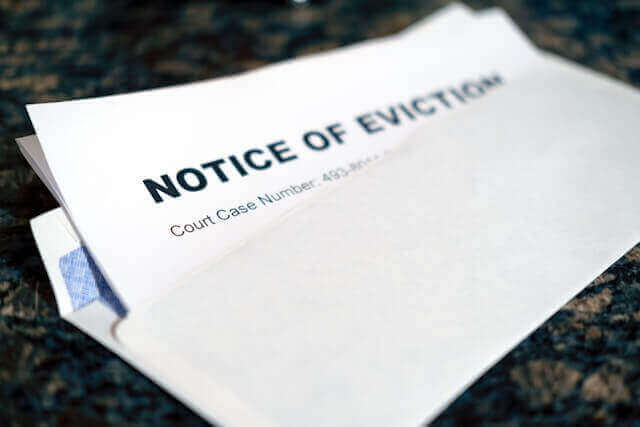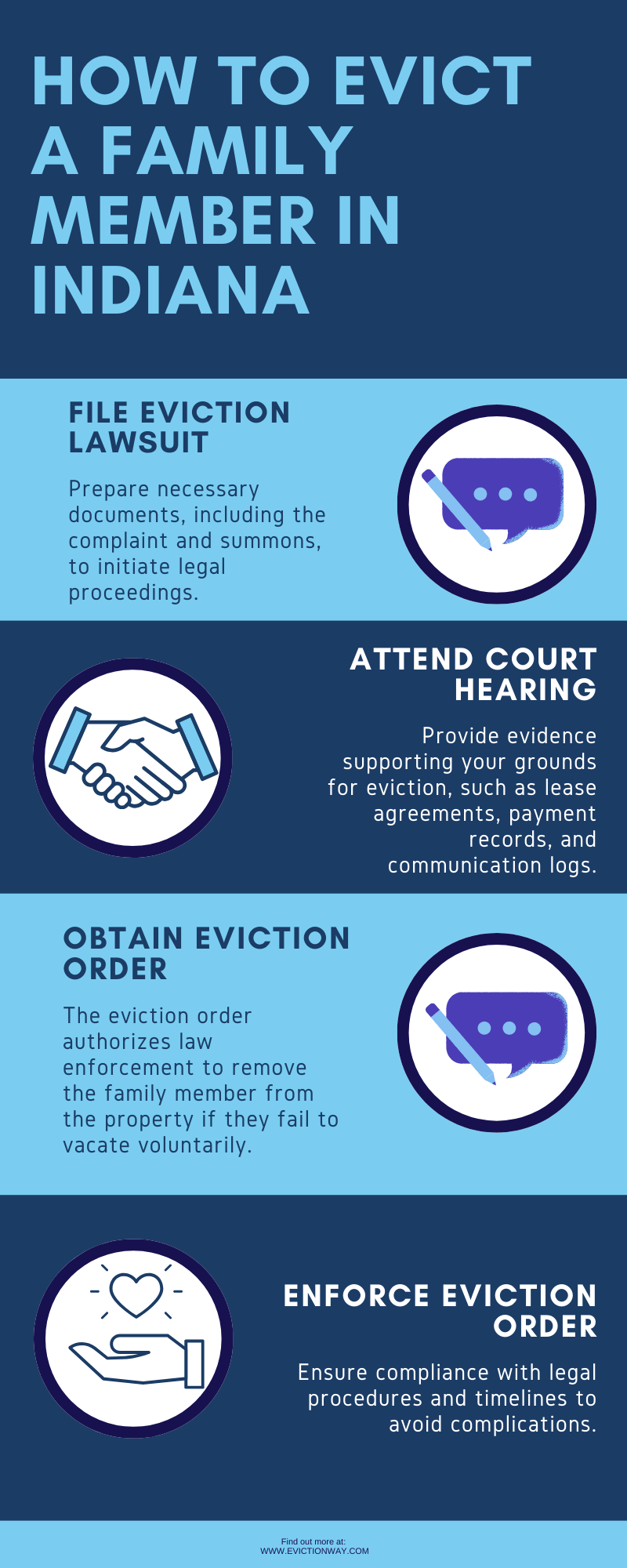Evicting a family member can be a difficult and emotional process, but it may be necessary to protect your rights and property. If you’re facing this situation in Indiana, this blog article will provide you with the information you need.
We’ll share the legal steps involved in evicting a family member in Indiana, including the notice requirements and the eviction process. We’ll also provide tips on how to remove a family member politely and respectfully, and how to deal with the emotional challenges of evicting a loved one.

In addition, we’ll discuss the laws that apply to evictions in Indiana, including the landlord-tenant laws and the Fair Housing Act. We’ll also provide legal tips to help you protect your rights and avoid any legal pitfalls.
How To Evict a Family Member In Indiana
Evicting a family member can be a difficult and emotional process, but it is sometimes necessary to protect your rights and property. If you are considering evicting a family member in Indiana, it is important to understand the legal process and your rights as a landlord.
1. Give Proper Notice
The first step in evicting a family member is to give them proper notice. In Indiana, you must give your tenant at least 30 days’ written notice to vacate the property. The notice must state the reason for the eviction and the date by which the tenant must vacate.
2. File a Complaint with the Court
If your tenant does not vacate the property after receiving the notice, you will need to file a complaint with the court. The complaint should state the facts of the case and the relief you are seeking, such as an order of eviction.
3. Serve the Complaint on Your Tenant
Once you have filed the complaint, you will need to serve it on your tenant. This can be done by having a sheriff or process server deliver the complaint to your tenant in person.

4. Attend the Eviction Hearing
After the complaint has been served, there will be an eviction hearing. At the hearing, you will have the opportunity to present your case to the judge. Your tenant will also have the opportunity to present their case.
5. Obtain an Order of Eviction
If the judge rules in your favor, they will issue an order of eviction. This order will give your tenant a specific amount of time to vacate the property.
6. Enforce the Order of Eviction
If your tenant does not vacate the property by the deadline specified in the order of eviction, you can have the sheriff enforce the order. The sheriff will remove your tenant from the property and lock it up.
Additional Resources for Indiana eviction help:
3 day eviction notice Indiana
In Indiana, a 3-day eviction notice indeed serves as a legal document that landlords can utilize when tenants breach their lease agreements.
This notice essentially notifies tenants that they have three days to rectify the violation or vacate the premises. It’s a crucial step in the eviction process and provides tenants with a final opportunity to resolve the issue before further legal action is taken.
You can download 3 day eviction notice Indiana here.
10 day eviction notice Indiana
In Indiana, a 10-day notice to quit for non-payment of rent is a document used by landlords to inform tenants they’ve missed rent. It gives the tenant 10 days from the date they receive the notice to do one of two things:
- Pay the rent in full
- Vacate the property
If the tenant doesn’t comply within the 10 days, the landlord can then proceed with filing an eviction lawsuit in court.
You can download 10 day eviction notice Indiana here.
How Much Does it Cost to Evict a Family Member in Indiana?
Evicting a family member can be a difficult and expensive process. The cost of eviction will vary depending on the specific circumstances of the case, but there are some general costs that you can expect to incur.
| Cost Category | Estimated Cost Range (USD) | Notes |
|---|---|---|
| Court Filing Fees | $85 – $157 | Varies by county and the amount of the claim. |
| Process Server Fees | $25 – $100 | Depending on the location and difficulty of service. |
| Attorney Fees | $500 – $5,000+ | Can vary widely based on the complexity of the case. |
| Locksmith | $75 – $200 | If changing locks is necessary post-eviction. |
| Storage and Moving | $100 – $2,000+ | If the evicted party leaves property behind. |
| Lost Rent | Varies | Income lost during the eviction process and vacancy. |
| Property Damage Repair | Varies | If the family member caused damage to the property. |
- Filing fees: The first step in the eviction process is to file a complaint with the court. The filing fee for an eviction complaint in Indiana is $157.
- Service of process: Once the complaint has been filed, it must be served on the tenant. The cost of service of process will vary depending on the method of service used.
- Court costs: If the tenant does not respond to the complaint, the landlord may be able to obtain a default judgment. The cost of a default judgment is $50.
- Attorney fees: If the tenant contests the eviction, the landlord may need to hire an attorney. The cost of an attorney will vary depending on the complexity of the case.
In total, the cost of evicting a family member in Indiana can range from $200 to $7,000 or more.

FAQs: Evicting a Family Member in Indiana
Here are some of the most asked questions.
What are the grounds for evicting a family member in Indiana?
In Indiana, you can evict a family member for the same reasons you would evict any other tenant, such as nonpayment of rent, violating the lease agreement, or causing damage to the property.
Do I need to give my family member a notice before evicting them?
Yes, you must give your family member a written notice to vacate the property. The notice period varies depending on the reason for eviction, but it is typically 30 days.
Can I evict my family member if they are not on the lease?
Yes, you can evict a family member even if they are not on the lease. However, you will need to prove that they are a tenant, such as by showing that they have been paying rent or living in the property for a period of time.

What is the process for evicting a family member?
The process for evicting a family member is the same as the process for evicting any other tenant. You must give them a written notice to vacate, file a complaint with the court, and attend a hearing.
Can I get help with evicting a family member?
There are several resources available to help you evict a family member, such as legal aid organizations and tenant advocacy groups. You can also contact the Indiana Housing and Community Development Authority for assistance.
How to fight an eviction in Indiana?
To fight an eviction in Indiana, you should respond to the eviction notice, gather evidence to support your case, and attend the court hearing.
How long does an eviction stay on your record in Indiana?
An eviction can stay on your record in Indiana for up to seven years, impacting your ability to rent in the future.
What is the eviction code in Indiana?
Indiana’s eviction laws and procedures are outlined in the Indiana Code Title 32, Article 31.
Can you go to jail for eviction in Indiana?
Eviction itself is not a criminal offense in Indiana, but related actions, like property damage or violence, can lead to legal consequences.
What happens if you miss eviction court in Indiana?
If you miss the eviction court date in Indiana, the judge will likely rule in favor of the landlord, and you may be evicted.
How fast can you be evicted in Indiana?
The eviction timeline in Indiana varies depending on the circumstances, but it generally takes at least a few weeks.
Can you stop an eviction in Indiana?
You may be able to stop an eviction in Indiana by addressing the landlord’s concerns, seeking rental assistance, or negotiating a payment plan.
Can someone be evicted in Indiana if they don’t have a lease? What rights do they have?
Yes, Indiana lets landlords evict without a lease. In Indiana, tenants without a lease are typically considered month-to-month tenants and have rights, including the right to receive written notice before eviction. The specific notice period can vary but is often 30 to 60 days.
Related:

Are there any specific timelines or procedures landlords must follow when evicting tenants without a lease in Indiana?
Yes, in Indiana, landlords must provide tenants without a lease with a written notice before initiating eviction proceedings. The notice period is typically 30 to 60 days, depending on the reason for eviction and local regulations.